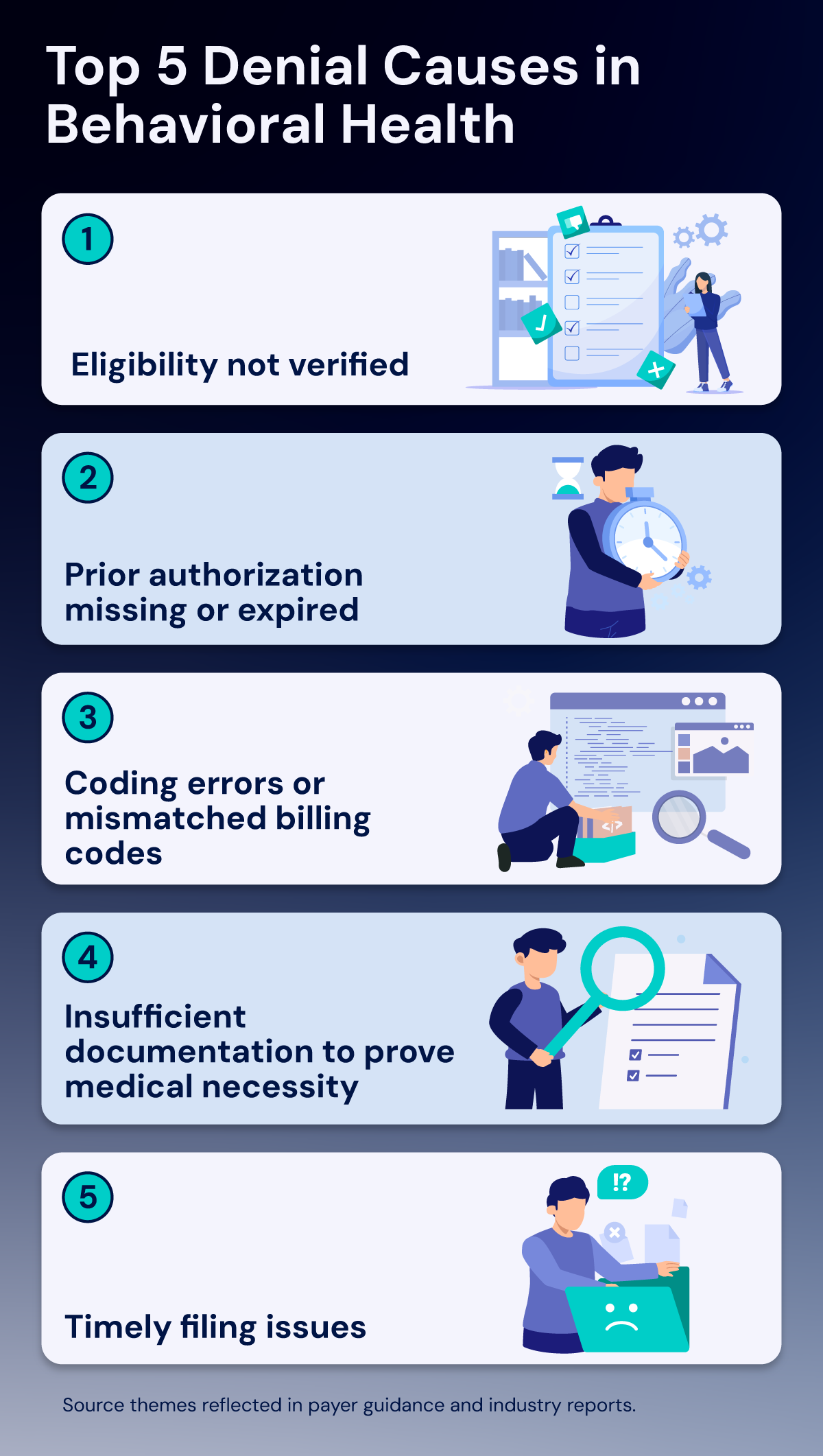Behavioral health practices face more claim denials than many other healthcare specialties, yet there is a clear path to prevention. This guide explains how to reduce claim denials in behavioral health billing: why they happen and which tools help you stop them before they start.
Why denials are so common in behavioral health
Behavioral health requires extra proof of medical necessity, detailed notes, and tight coordination with payer policies. Compared with other healthcare specialties, the billing complexities are different because treatment plans often change as therapy progresses, and services can span weeks or months.
Common drivers include:
- Prior authorization rules that differ across insurance plans and payer specific requirements
- Strict medical necessity documentation for mental health services and behavioral health services
- Non-covered services in certain benefit designs, or unclear telehealth coverage
- Coding errors and incorrect coding for longer visits or substance use disorder treatment
- Timely filing issues when scheduling and notes are delayed
Behavioral health claim denials also rise when insurance coverage is misunderstood, or when behavioral health claims do not match what the patient’s insurance shows for benefits, visit limits, or authorization requirements.

The true cost of claim rejections
Every denied claim adds rework, follow up calls, and delayed revenue. Costly denials slow cash flow, increase administrative burdens, and impact financial performance and financial stability. They also pull behavioral health professionals away from patient care.
Industry resources point to the friction behind eligibility and authorization:
- The CAQH Index shows that eligibility verification and prior authorization remain among the most time-consuming transactions across health services.
- CMS coding resources such as the National Correct Coding Initiative stress correct coding to reduce avoidable edits and health claim denials.
When behavioral health providers must appeal or resubmit an insurance claim, teams lose time and may face lost revenue if deadlines pass. Mental health claim denials are often preventable with better up front checks, accurate documentation, and clean edits.
Free Denial Rate Review
We will analyze a recent month of behavioral health claims to identify fast wins. Expected follow-up time within 1 business day.
5 ways to reduce denials (that are backed by data)
The strategies outlined below focus on denial prevention first, then efficiently handling denials when they occur. Use your denial data to develop targeted strategies that fit your payer mix.
1. Nail eligibility verification before the visit
- Verify insurance eligibility and benefits, including visit limits, copays, and service caps for mental health services.
- Confirm patient eligibility and verify insurance coverage for the specific services provided, including telehealth coverage when relevant.
- Capture insurance details accurately, including member ID and plan type.
Modern RCM software can run automated eligibility checks in real time, reducing the manual work for staff and preventing common benefit mismatches.
2. Strengthen authorization management
- Track prior authorization start and end dates closely, and confirm authorization requirements for each payer.
- Watch for authorization issues, such as expired approvals or missing documentation for medical necessity.
- Keep a log by patient and service to ensure coverage before rendering services.
Result: Fewer automatic denials when you submit claims because approvals are confirmed in advance. Software with authorization dashboards and alerts can also help you track start and end dates so approvals don’t slip through the cracks.
3. Improve documentation and coding hygiene
- Align clinical documentation with payer policies and the services provided. Include diagnosis, goals, and progression in treatment plans.
- Use accurate billing and correct billing codes that match time, modality, and complexity. Avoid coding errors and incorrect coding.
- Emphasize medical necessity and medical necessity documentation in session notes. This helps in ensuring accurate documentation that supports mental health billing and behavioral health claims.
If documentation is weak or incomplete, payers often cite insufficient documentation as the denial reason.
4. Protect your timelines and clean claim edits
- Set reminders to submit claims quickly to avoid timely filing issues.
- Use billing software or edits to catch human error before submission, for example missing modifiers or place of service.
- Review claims for accuracy against payer policies and authorization data.
Clean claims go through faster, keep your revenue cycle healthy, and reduce denials without extra rework.
5. Close the loop with analytics and training
- Analyze denial data by payer and reason, then create targeted strategies per plan.
- Provide ongoing education for front desk, clinicians, and billers on payer-specific requirements.
- Standardize checklists so healthcare providers and mental health providers collect what each insurance company needs the first time.
This loop helps behavioral health organizations improve financial performance and keep the focus on patient care. Analytics modules in RCM platforms can surface denial trends faster than manual tracking, giving you clearer data to use in training.
Further reading: Boosting Behavioral Health Billing Efficiency with EMR Automation
How RCM software can automate denial prevention
Purpose-built tools can make a big difference in behavioral health. Advanced RCM technology helps you:
- Automate eligibility verification checks and flag benefits conflicts at scheduling
- Centralize authorization management and alert your team before authorizations expire
- Apply payer specific edits to behavioral health claims and catch common issues early
- Organize denial management workflows so your team can triage, appeal, and track outcomes
- Surface trends across insurance claim outcomes, then guide targeted strategies
Want a practical next step? Learn how Benji’s automation and workflows can reduce denials before they happen with intelligent RCM tools.
Better tools reduce denials
Behavioral health is unique, and so are its billing needs. With up-front checks, clear documentation, and focused denial management, you can reduce denials and protect your revenue cycle. Pair process discipline with technology, and you will see fewer denied claims, faster payments, and stronger outcomes for mental health services.

